NHS strikes see man’s life-changing op cancelled TWICE – as wife reveals third could be called off due to walkouts
A woman has told how her husband’s surgery to relieve his crippling migraines has been canceled twice due to strikes by NHS medics.
Fiona Chapman, from Wadebridge, Cornwall, said her partner was due to have the procedure in June but it was canceled due to doctors’ industrial action.
His surgery – which would involve placing a device at the back of the head that zaps nearby nerves to ease pain – was postponed to August, but was canceled again.
Mrs Chapman, whose husband can no longer work due to his severe pain, was told by doctors they hope to operate in October – but has been warned that further strikes by NHS staff could lead to further delays.
It comes as trainee doctors today enter their third day of strike this week.
Fiona Chapman (pictured), from Wadebridge, Cornwall, said her partner was due to have the procedure in June but it was canceled due to doctors’ industrial action
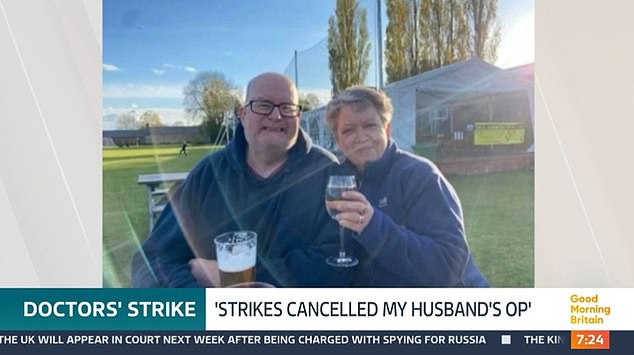
Mrs Chapman, whose husband (left) can no longer work due to his severe pain, was told by doctors they hope to operate in October – but has been warned that further strikes by NHS staff could lead to further delays.
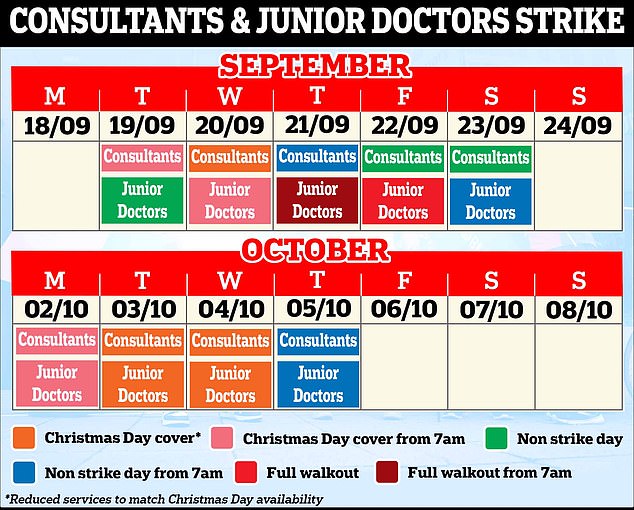
Consultants in England have joined the picket lines on four separate days so far this summer, while junior doctors have staged 19 days of strike action this year. Both will return to the picket lines together on October 2, 3 and 4. Radiographers will also join medics in walking out for 24 hours from 8am on October 3. The strike days also coincide with Rishi Sunak’s first Tory party conference as leader. and Prime Minister
Mrs Chapman told Good Morning Britain: ‘My husband is waiting to go to a specialist hospital in London to have a massager placed in his scalp as he suffers from chronic migraines.
‘He has suffered from it all his life, but it has become much worse in recent years, to the point that he is now medically retired as the pain prevents him from working.
‘He was due to have an operation in June and it was canceled due to the doctors’ strike, with ten days’ notice.
‘Was moved to August and canceled again and we are now hoping for a provisional date in October.
“But again, we’re told this will be dependent on scheduling due to the doctors’ strike.”
It comes as trainee doctors enter the final day of their latest round of industrial action. The strike, which started at 7 a.m. on Wednesday, will conclude on Saturday morning.
Consultants also stood on picket lines for 48 hours this week, marking the first time in the 75-year history of the health service that both groups of medics have taken coordinated strike action.
This ensured that patients in hospitals had ‘Christmas Day’ cover, while emergency departments were staffed and wards had basic cover.
Further joint action by both groups of doctors is planned for October 2, 3 and 4.
Health leaders warned patients to expect five ‘Christmas’ over the next three weeks, meaning most non-urgent care has been cancelled.
Before this week’s strikes, trainee doctors had been on strike for 19 days this year, with consultants taking to the picket lines on four separate days.
Many routine hospital appointments and treatments, including cancer care, have been postponed due to industrial action, which is being coordinated by the British Medical Association (BMA).
Senior leaders expect the toll to reach 1 million as a result of the latest strikes, with 100,000 cancellations expected this week alone.
However, they have warned that the real impact on patients is much worse, as some hospitals have stopped scheduling procedures for strike days, meaning these are not reflected in the data.
But patients have been urged to still attend appointments if they have not been told the appointment has been canceled – as some doctors are still working.
Dr. Vivek Trivedi, co-chair of the BMA’s junior doctors committee, told Good Morning Britain: ‘I am shocked that Fiona and her family and her husband have unfortunately had to reschedule their appointments and operations in this case due to the continued failures of Our government .
‘Our government has allowed a workforce crisis to develop which has seen our waiting lists increase by millions in recent years before strike action took place.
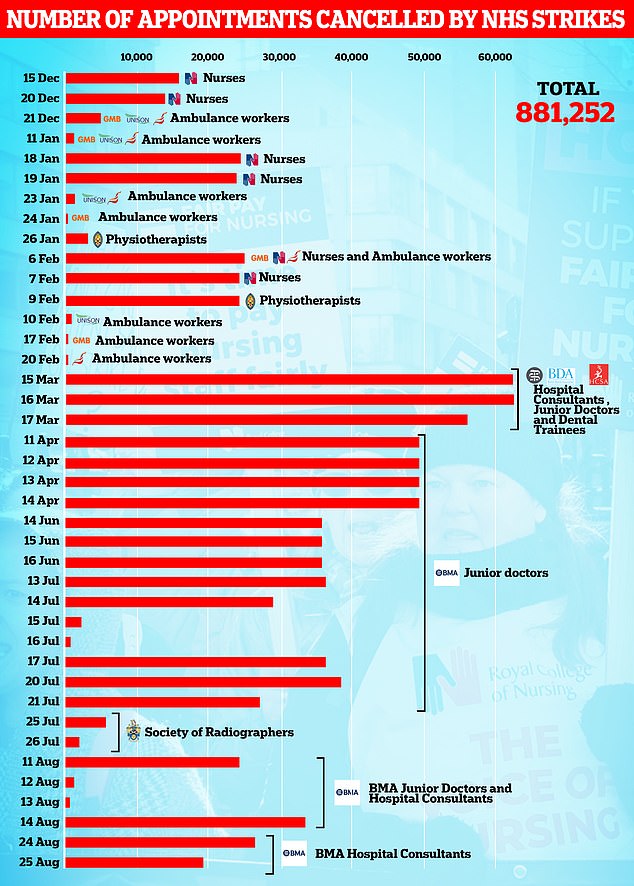
Some 885,154 appointments have been postponed since the NHS industrial action – involving staff such as doctors, nurses and paramedics – started in December.
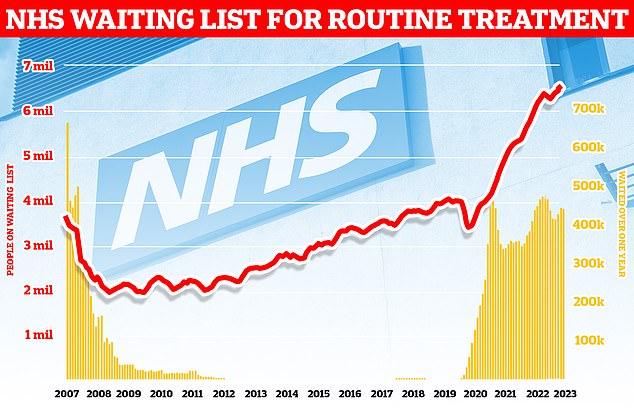
England’s backlog of procedures such as hip and knee replacements now stands at 7.6 million, official figures revealed last week. It means about one in seven people across the country are currently stuck in the system awaiting care. More than 380,000 patients have not been treated for a year, often with pain
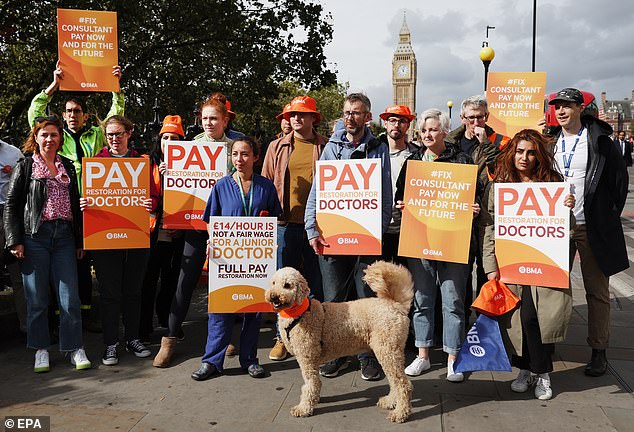
Pictured: NHS consultants and trainee doctors carry banners as they strike outside St Thomas’ Hospital in London on September 20
“And all we wanted to do was have a reasonable conversation with the government about how doctors are underpaid and therefore can’t properly care for patients.
“But they have ignored us and forced us into strike action and have made no effort to avert that strike action, which is a very different approach to what we have seen from our colleagues in Scotland.
‘So of course I am sorry to Fiona and her family that the strike action has caused disruption.
“But by nature, it has to be disruptive to put pressure on the government to come back to the table.
“But in both cases the government failed to act and this could have been prevented in the first place.”
The BMA, which is behind the strikes, states that doctors have seen their wages fall by 35 percent over the past fifteen years. As a result, junior doctors have called for a 35 percent pay increase, while consultants have set their pay demands at 11 percent.
By comparison, the government has offered trainee doctors a pay rise of between 8.1 and 10.3 percent, while consultants were offered six percent.
Health Minister Steve Barclay this week accused the BMA of ‘increasing militancy’.
He launched a consultation on proposed minimum service laws, which could send medics off the picket lines into hospitals during strike action to shield patient care.
Mr Barclay revealed that unions that fail to supply enough medics to cover strike days could be hit with £1 million fines under the new rules, which if passed are not expected to come into force until next year .
He said: ‘The BMA or other unions that deliberately breach service levels could face fines of up to £1 million.
‘It is worth reiterating that junior doctors have received a fair and reasonable pay increase – as recommended by the independent pay review body.’
The NHS has reported 22 critical incidents since healthcare strikes began in December – where an NHS trust is unable to provide critical services, meaning patients could be at risk.
As a result, critical care patients have been transferred to other hospitals due to staff shortages, while cancer surgeries and treatments have been postponed.
Meanwhile, it was revealed this week that due to staff shortages caused by the strikes, the NHS is paying thousands of pounds for doctors to cover shifts.
In one case, Plymouth University Hospitals paid a consultant more than £3,000 for a 12-and-a-half hour night shift, which would be carried out by a junior doctor, according to a University of Plymouth study. BBC Freedom of information request.
